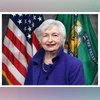'Not at all sensible': Ex-US treasury secretary on Trump's tariff strategy
Janet Yellen slams Trump tariffs as 'unclear', warns of trade decoupling, but sees no Fed intervention needed yet despite market turmoil
)
Janet Yellen (Photo: Wikimedia Commons)
Listen to This Article
Former US Treasury Secretary Janet Yellen has questioned the logic behind President Donald Trump’s tariff measures, describing them as “unclear and not at all sensible”. She remarked that China may be inclined to “de-escalate this conflict” in trade relations, Bloomberg reported.
Yellen, who also led the Federal Reserve under Barack Obama and first Trump administration, shared her views during an appearance on Bloomberg Television’s Balance of Power on Monday. Commenting on recent financial market movements, Yellen said the instability in the bond market and the weakening dollar point to “a loss of confidence,” although she emphasised that the situation has not reached a level that would require Federal Reserve intervention.
“Steps toward removing the tariffs, lowering them, are positive, but we’re in a world of tremendous uncertainty,” she said.
Questions over tariff targets and strategy
Yellen expressed confusion over the Trump administration’s approach, particularly regarding some of the countries targeted by tariffs. She criticised the methodology used, noting that tariffs were often based on bilateral trade deficits rather than reciprocal trade policies, the news report said.
“I’m confused about what the Trump administration will be looking for with Vietnam for example,” she said. “We actively encouraged Vietnam to begin to produce goods that we were dependent on China for. For national security purposes we wanted diversification of supply chains.”
Also Read
Potential for de-escalation with China
She suggested that China might be open to removing recent trade restrictions if the US reciprocated. According to Yellen, the current tariff levels between the US and China are so high that they could severely restrict trade and push the two economies toward a damaging separation.
“I think that the tariffs we’ve placed on China are going to impose very significant burdens on American households. Of course, things are changing by the day,” she said.
Despite the global economic uncertainties, Yellen maintained that the US economy remains resilient. She does not foresee a need for Federal Reserve action at this point.
“If real financial stability concerns were to arise, I believe the Fed would think about using its liquidity facilities as it did at the beginning of the pandemic,” she said. “But we’re not at that point yet.”
Trump’s reciprocal tariffs
On April 2, President Trump announced sweeping new tariffs as part of a dramatic escalation in US trade protectionism. Framing the day as ‘Liberation Day’, Trump signed an executive order imposing a minimum 10 per cent tariff on all US imports, effective April 5, citing persistent trade deficits and the need to protect American manufacturing. While most countries faced this 10 per cent tariff, Trump imposed much steeper rates on nations with which the US has significant trade deficits, most notably China.
The US-China tariff war intensified sharply following this announcement. Initially, the US raised tariffs on Chinese imports to 54 per cent, but after a series of retaliatory moves, the rate soared to 145 per cent by mid-April. China responded in kind, increasing its tariffs on American goods to 125 per cent and implementing additional export controls, particularly on critical rare earth materials. Both sides have signalled little willingness to negotiate, with China dismissing further US tariff hikes as economically irrational and vowing to ‘fight to the end’.
More From This Section
Don't miss the most important news and views of the day. Get them on our Telegram channel
First Published: Apr 15 2025 | 10:25 AM IST